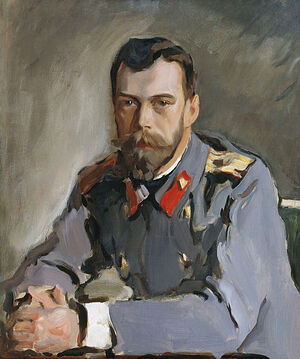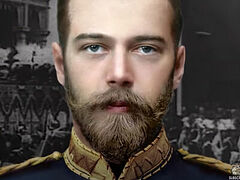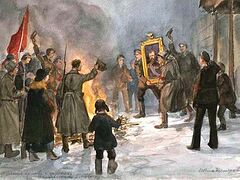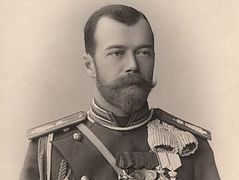 Valentin Serov. Portrait of Emperor Nicholas II. 1900 The holy Tsar Nicholas II is perceived by us today as an angel sent to earth by God on the eve of the apocalyptic storms in Russia and around the world. He was given as a model of an Orthodox sovereign for all times, to show what we are deprived of by losing the Orthodox monarchy. Instead of the Anointed of God, Russia received the anointed ones of satan. Everything turned upside down; everything was swept away. All attempts to keep the disintegration at bay were in vain. Even the liberal Vladimir Nabokov was forced to state that as soon as the “complete legality and justice” that the liberals dreamed of prevailed, then began the most terrible bloody lawlessness.
Valentin Serov. Portrait of Emperor Nicholas II. 1900 The holy Tsar Nicholas II is perceived by us today as an angel sent to earth by God on the eve of the apocalyptic storms in Russia and around the world. He was given as a model of an Orthodox sovereign for all times, to show what we are deprived of by losing the Orthodox monarchy. Instead of the Anointed of God, Russia received the anointed ones of satan. Everything turned upside down; everything was swept away. All attempts to keep the disintegration at bay were in vain. Even the liberal Vladimir Nabokov was forced to state that as soon as the “complete legality and justice” that the liberals dreamed of prevailed, then began the most terrible bloody lawlessness.
The murder of Tsar Nicholas Alexandrovich is perhaps the central event of the twentieth century. It was prepared, as Archimandrite Konstantin (Zaitsev) wrote, by the fact that “the mystical awe before the royal power and the religious conviction that the anointed Tsar brings with him the grace of God, which mustn’t be spurned and replaced with our own speculations, was no longer there—it disappeared,” as, we will add, it disappeared even earlier throughout the rest of the world.
This didn’t happen in a day, and it didn’t begin during the reign of Tsar Nicholas. The destruction of the Royal Family was already an obligatory item in the Decembrists’ program, and the English and French revolutions solved this problem even earlier. The idea of building an earthly kingdom with the rejection of the Heavenly one is gradually developing in the depths of the centuries, and in the future must inevitably be identified with the last apocalyptic events of history. It’s absurd to blame our holy Tsar for all the troubles, as progressive historians do; as if there were no nihilists before his reign, as if the lives of the faithful servants of the Tsar and the fatherland weren’t exposed to daily danger by terrorists, as if Sts. Ignatius (Brianchaninov), Theophan the Recluse, and John of Kronstadt hadn’t prophesied about an imminent and terrible catastrophe for the sins of the Russian people! In fact, everything began much earlier.
The Russian Church recognizes a type of holiness known as passion-bearing: It glorifies those who endured suffering. The holy passion-bearing princes occupy a special place in the heart of the Russian people. They were tortured, not as if for confessing their faith, but because they were victims of political ambitions, caused by a crisis of power. But it was suffering for fidelity to Christ—for Christ! The similarity of their innocent deaths to the sufferings of Christ is striking. Like Christ in Gethsemane, the first Russian martyrs Boris and Gleb were captured by cunning, but showed no resistance, despite the fact that their attendants were willing to come save them. Like Christ on Golgotha, they prayed for their executioners. Like the Savior in the agony of death, they were tempted to act according to their own will, and, like Him, rejected it.1 In the consciousness of the young Russian Church, this was combined with the image of that innocent victim of whom the Prophet Isaiah speaks: He is brought as a lamb to the slaughter, and as a sheep before her shearers is dumb, so He openeth not His mouth (Is. 53:7). “Gleb’s cook, named Turchin,” writes the Chronicler, “slaughtered him, like a lamb.”
Princes Igor of Kiev and Chernigov, Mikhail of Tver, Tsarevich Dmitry of Uglich, and Andrei Bogoliubsky were passion-bearers in exactly the same way. In the sufferings and death of these saints, there is much that unites them with the fate of the Royal Martyrs. Concerning the death of the holy Prince Igor, in the fact that he was killed when he could no longer threaten anyone’s power, and in his dying prayer before the icon of the Mother of God, there is something painfully akin to [Tsar Nicholas] the Ekaterinburg prisoner. There is the same grief, the same prayer that the Royal Martyrs offered at their last Divine service, the same brazen mockery of the unbridled guards and the bestial fury of the crowd, as at the murder of the holy Princes Igor, Mikhail, and Andrei; the same horror, up to the striking (more than simply internal) coincidence of details. It seems that if you listen attentively, you can hear the thundering shots of revolvers from the basement of the Ipatiev House, like an echo in the depths of the ancient centuries. There is the same desecration of the dead bodies and the same satanic fury, with which all memory of them, and even of the house where the crime occurred, was destroyed.
The presence of the “mystery of iniquity” is visible even in the external circumstances of the Ekaterinburg atrocity. As General Dieterichs noted, the Romanov Dynasty began in the Ipatiev Monastery of the Kostroma Governorate and ended in the Ipatiev House in Ekaterinburg. The servants of Beelzebub, who would soon build public toilets on the site of the altars and demolished churches, deliberately chose both the place and the day of the crime, which coincided with the day of the memory of St. Andrei Bogolyubsky—the prince who, if not in name, was in fact the first Russian tsar.
The enemies understood perfectly well that the destruction of the “entire great litany,” as Lenin and Trotsky put it, would be a profanation of the oath of allegiance before the Cross and Gospel that the Russian people swore at the Council of 1613 to build life in all its spheres, including state and political, on Christian principles.
Millions of Orthodox Christians who renounced their faith participated in this crime. The great revolutions, which are attempts to temporarily “save” humanity—should they not, coming to a logical conclusion, become a war not only against the Anointed of God, but also against the entire Church—a desire to liberate oneself from all forms of the sacred and even, in the end, from truth and justice? And indeed, after the revolution in Russia, the Church appeared to many an outdated institution, condemned to extinction.
This was the whole point of the 1917 revolution. There is an examination of human civilization taking place here, and therefore all the forces of evil were bent in opposition to Orthodox monarchy. Was it really by chance that it was precisely the communist, Marxist-Leninist ideology that ultimately attacked the Anointed of God, with all its hatred? This was the ultimate expression of the chiliastic false teaching with the hope of an earthly kingdom. And its second echelon is now coming with the abolition of all moral obstacles to achieving earthly happiness. And we still have a long way to go to understand that this event of the century means not only regicide, but also infanticide—the beginning of the destruction and ruin of millions of Christian families.
***
Speaking of the holiness of Tsar Nicholas, we usually mean his martyric podvig, which, of course, is connected with his whole pious life. But we should also take a closer look at the podvig of his abdication—his podvig of confession. We have often said that here was revealed his podvig of the humble acceptance of God’s will. But it’s also of exceptional importance that this was a podvig of preserving the teaching of Orthodox monarchy in purity. To understand this more clearly, let us recall who sought the Tsar’s abdication. First of all, it was those who sought to turn Russian history towards European democracy, or, at least, to a constitutional monarchy. The Socialists and Bolsheviks were a consequence and extreme manifestation of the materialist understanding of history.
It’s known that many of the destroyers of Russia of that time acted in the name of its edification. Among them were many who were honest and wise in their own way, who were looking for “how to develop Russia.” But it was, as Scripture says, “earthly, sensual, and demonic wisdom.” The rock that the builders were rejecting then was Christ and Christ’s anointing.
The anointing of God means that the earthly authority of the Tsar has a Divine source. The renunciation of the Orthodox monarchy was the renunciation of Divine authority; of authority on earth, which is designed to direct the general flow of life to spiritual and moral goals—to create the most favorable possible conditions for the salvation of many; authority that is “not of this world,” but serves the world precisely in this, the highest sense. Of course, all things work together for good to those who love God, and the Church of Christ works salvation under any external conditions. But the totalitarian regime, and, in particular, democracy create an atmosphere in which, as we see, the average person cannot survive.
And the preference for a different kind of power, which primarily ensures earthly greatness, life according to one’s own and not God’s will, according to one’s own lusts (which is called “freedom”), cannot but lead to rebellion against the God-established power, against the Anointed of God. They wanted to show that all power belongs to them, regardless of any god, and grace and the truth of God’s Anointed are necessary only to embellish what belongs to them. This would mean that any lawlessness this authority commits will be committed as if by the direct blessing of God. It was a satanic plot—to defile grace, to mix truth with falsehood, to make the anointing of Christ meaningless and merely decorative. It would create that “external appearance,” in which, according to St. Theophan the Recluse, is revealed the “mystery of iniquity.” If God becomes external, then in the end, Orthodox monarchy becomes just an ornament of the new world order, giving way to the kingdom of the Antichrist. And as long as human history exists, the enemy will never abandon this plan.
The Tsar didn’t depart from the purity of the anointing of God, didn’t sell the Divine birthright for the lentil soup of earthly power. The meaning of the Tsar’s abdication was the salvation of the idea of Christian authority, and therefore the hope of salvation for Russia, through the separation of those who are faithful to the principles of life given by God from those who are unfaithful, through the purification that comes in subsequent events. As before the revolution, so now the main danger lies in “external visibility.” Many believe in God, in His providence, and strive to establish an Orthodox monarchy, but in their hearts rely on earthly power, on “horses and chariots.” Let everything, they say, be like the most beautiful symbol: the cross, the tricolor banner, the double-headed eagle, and we will arrange our own, earthly world, according to our earthly concepts. But the martyr’s blood of the Tsar convicts the apostates, both then and now.
You can do any kind of historical, philosophical, or political analysis you want, but spiritual vision is always more important. We know these prophecies of many of our saints, who understand that no emergency, external state measures, no repressions, no ingenious politics can change the course of events if the Russian people don’t repent. It was given to the truly humble mind of the holy Tsar Nicholas to see that this repentance would be given at a high price. In this light, all other arguments vanish like smoke.
***
All punishments are medicine, and the more bitter the disease, the more painful the healing. More than anything today, we’re afraid of the loss of Russia’s independence , and that’s understandable. But we shouldn’t confuse the effects with the causes: All the most terrible, most ruinous foreign invasions—be it Batu, Napoleon, or Hitler—are nothing compared to the hordes of demons that pervade everything within the people.
In the abdication of the Sovereign, in fact, all the main events of sacred history are refracted, the meaning of which is always the same mystery. For what was the Egyptian slavery and Babylonian captivity of the God-chosen people if not so that all their hope would be in the one God? What did the Roman occupation of Israel during the earthly life of the Savior mean? The same as the October Revolution of 1917 with its temptation of earthly well-being without God.
The thing is that the desire to preserve Orthodox monarchy at any cost is no different than the godlessness that was revealed in the violence of its destruction. It would be the same attempt to find a firm support other than God—this support always, according to the prophet, turns out to be a staff of reed—When they took hold of thee by thy hand, thou didst break, and rend all their shoulder: and when they leaned upon thee, thou brakest, and madest all their loins to quake (Ezek. 29:6-7).
***
As St. Nikolai (Velimirović) said in 1932: “The Russians have repeated the Battle of Kosovo in our days. Had Tsar Nicholas clung to the earthly kingdom, to the kingdom of egotistical motives and petty calculations, he would, in all probability, still be sitting on his throne in St. Petersburg today. But he clung to the Heavenly Kingdom, to the Kingdom of Heavenly sacrifices and evangelical morality, and because of this, he lost his life, together with his children and millions of his fellow men. Another St. Lazar and another Kosovo!”
By his podvig of passion-bearing, the Tsar put to shame, firstly, democracy—“the great lie of our time,” in the words of Konstantin Pobedonostsev, when everything is determined by the majority vote, and, in the end, by those who shout the loudest: “We don’t want Him, but Barabbas”—not Christ, but the Antichrist. And secondly, in the person of the zealots of constitutional monarchy, he denounced every compromise with falsehood—an equally great danger of our time.
We had prominent Tsars: Peter I, Catherine the Great, Nicholas I, Alexander III, when Russia reached its heyday with great victories and a prosperous reign. But the Tsar-Martyr Nicholas is a witness of true Orthodox statehood, a power built on Christian principles.
The main spiritual meaning of today’s events is the result of the previous twentieth century—the increasingly successful efforts of the enemy to make the “salt lose its savor,” that the highest values of humanity might turn into empty, merely beautiful words. If the people’s repentance is possible (and not just talk of repentance), it is thanks only to the faithfulness of Christ’s grace and the truth that the Royal Martyrs and all the Russian New Martyrs and Confessors have revealed.
The same light is present in the Tsar’s prophetic testament, transmitted by his daughter, that the evil that is now in the world (that is, the 1917 revolution) will become even stronger (what is happening today); but evil will not win, but love; and in the prayer of the cross of the Tsaritsa’s own sister for the whole of the Russian people: “Lord, forgive them, for they know not what they do.” It’s thanks only to this fidelity, this light, that there is hope that maketh not ashamed (Rom. 5:5) amidst the utter hopelessness of our days.
1 It should be clarified that Christ experienced the blameless passion of shrinking away from death—as death is, in fact, unnatural to mankind, and all the moreso to Him Who is Life itself. He was not, however, tempted in the sense of experiencing internal wavering, of giving consideration to the possibility of doing anything other than the Father’s will.—Trans.




